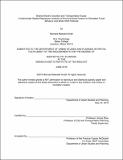Shared electric scooters and transportation equity : a multivariate spatial regression analysis of environmental factors on revealed travel behavior and mode shift potential
Author(s)
Arnell, Bernard Maxwell.
Download1139524474-MIT.pdf (34.31Mb)
Alternative title
Multivariate spatial regression analysis of environmental factors on revealed travel behavior and mode shift potential
Other Contributors
Massachusetts Institute of Technology. Department of Urban Studies and Planning.
Advisor
Jinhua Zhao.
Terms of use
Metadata
Show full item recordAbstract
The past year has seen the emergence of the shared electric scooter: a new form of micro-mobility in the United States. Electric scooters embody many of the historic trends and contradictions endemic to innovation and marginalization in the transportation space. Researchers and policy-makers are faced with a number of unanswered questions about who travels on scooters and what factors might influence when and how they are used. Hexagonal spatial binning feeds a series of spatial lag models to identify explanatory environmental and demographic variables for trip characteristics. These models reveal that employment density and the location of rebalance points are among the strongest indicators of scooter activity overall, but show significant variation when models are subsetted by time of day. The Communities of Concern framework, adapted from the Association of Bay Area Governments, provides a regionally-sensitive index of relative marginalization to undergird the analysis. These findings are placed in context with transportation justice and broad outlines of current e-scooter policy. Additionally, a framework for examining mode shift potential using Open Trip Planner is discussed, and preliminary results are described. Use patterns are also analyzed by time and in relation to contemporaneous weather.
Description
This electronic version was submitted by the student author. The certified thesis is available in the Institute Archives and Special Collections. Thesis: M.C.P., Massachusetts Institute of Technology, Department of Urban Studies and Planning, 2019 Cataloged from student-submitted PDF version of thesis. Includes bibliographical references (pages 132-140).
Date issued
2019Department
Massachusetts Institute of Technology. Department of Urban Studies and PlanningPublisher
Massachusetts Institute of Technology
Keywords
Urban Studies and Planning.